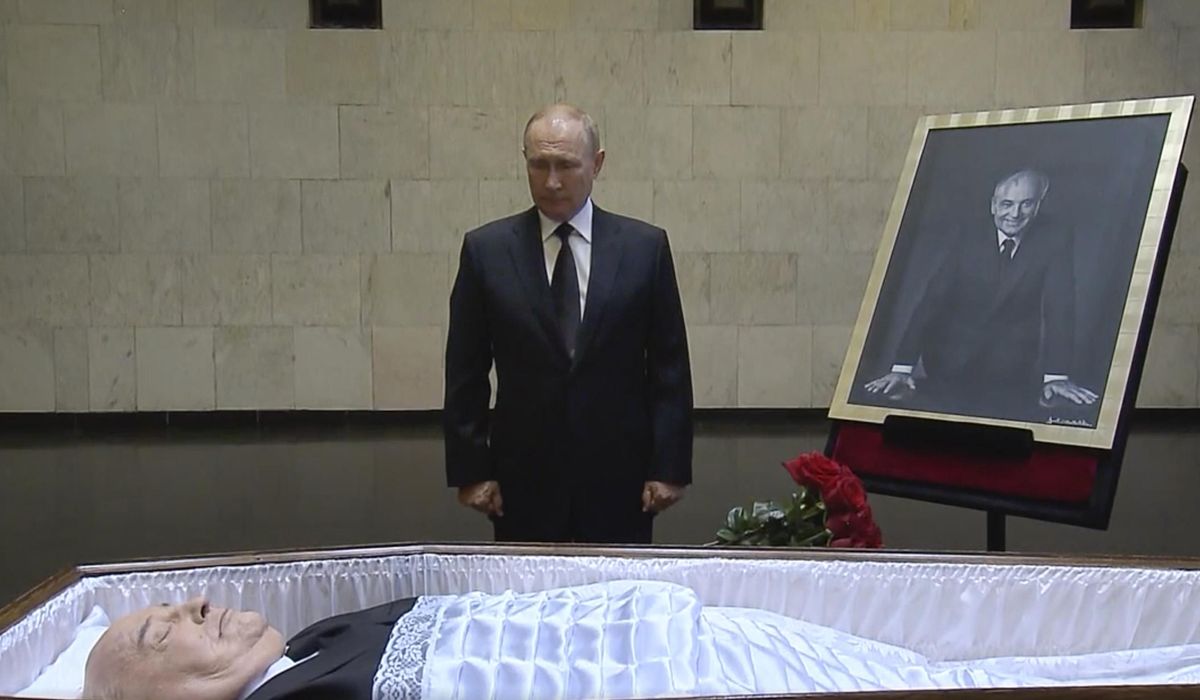
MOSCOW (AP) — Former Soviet President Mikhail Gorbachev is set to be buried Saturday in a ceremony falling short of a state funeral that will not be attended by Russian President Vladimir Putin or top international leaders.
The relatively low-key funeral reflects the Kremlin’s uneasiness about the legacy of Gorbachev, who has been revered in the West for ending the Cold War but despised by many at home for the collapse of the Soviet Union and the ensuing economic meltdown that plunged millions into poverty.
Putin privately laid flowers at Gorbachev’s coffin on Thursday because of what the Kremlin described as the president’s busy schedule that would prevent him from attending the funeral.
Asked what specific business will keep Putin busy, Kremlin spokesman Dmitry Peskov said in a conference call with reporters that the president will have a series of working meetings, an international phone call and must also prepare for attending a business forum in Russia’s Far East next week.
Gorbachev, who died Tuesday at the age of 91, will be buried at Moscow’s Novodevichy cemetery next to his wife, Raisa, following a farewell ceremony at the Pillar Hall of the House of the Unions, an iconic mansion near the Kremlin that has served as the venue for state funerals since Soviet times.
Despite the choice of the prestigious venue, the Kremlin stopped short of calling it a state funeral, with Peskov saying the ceremony will have “elements” of one, such as honorary guards, and the government’s assistance in organizing it. He wouldn’t describe how it will differ from a full-fledged state funeral.
If the Kremlin had declared a state funeral for Gorbachev, it would have made it awkward for Putin to ignore the event. It would also have obliged the Kremlin to send invitations to foreign leaders, something that it was apparently reluctant to do amid soaring tensions with the West after sending troops into Ukraine.
Putin, who once bemoaned the collapse of the Soviet Union as the “greatest geopolitical catastrophe of the century,” has avoided explicit personal criticism of Gorbachev but has repeatedly blamed him for failing to secure written commitments from the West that would rule out NATO’s expansion eastward. The issue has marred Russia-West relations for decades and fomented tensions that exploded when the Russian leader sent troops into Ukraine on Feb. 24.
In a carefully-phrased letter of condolence released Wednesday avoiding explicit praise or criticism, Putin described Gorbachev as a man who left “an enormous impact on the course of world history.”
“He led the country during difficult and dramatic changes, amid large-scale foreign policy, economic and society challenges,” Putin said. “He deeply realized that reforms were necessary and tried to offer his solutions for the acute problems.”
The Kremlin’s ambivalence about Gorbachev was mirrored in state television broadcasts, which paid tribute to Gorbachev as a historic figure but described his reforms as poorly planned and held him responsible for failing to properly defend the country’s interests.
The Russian public has remained similarly divided over Gorbachev’s legacy, with some praising him for ending the Cold War and shedding seven decades of totalitarian rule and others accusing him of betrayal.
